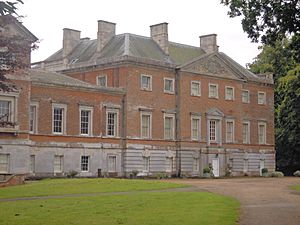Horatio Walpole, 1st Baron Walpole facts for kids
Horatio Walpole, 1st Baron Walpole (born December 8, 1678 – died February 5, 1757) was an important English diplomat and politician. He was also a "peer," which means he held a special title, Baron Walpole. Horatio served as the British ambassador to France from 1724 to 1730. He was the son of Robert Walpole and the younger brother of Robert Walpole, who became the first Prime Minister of Great Britain.
Contents
Horatio Walpole's Early Life and Family
The Walpole family had owned land in Norfolk, England, since the 1100s. They took their name from the village of Walpole. Horatio was born at Houghton, a family estate. He went to Eton, a famous school, and then to King's College, Cambridge, where he became a fellow. His older brother, Robert Walpole, became a very powerful figure in British politics.
A Career in Politics and Diplomacy
Horatio Walpole started his political career in 1702 when he became a member of Parliament. He stayed a Member of Parliament for an amazing 54 years!
When his brother, Sir Robert Walpole, became the head of the treasury in 1715, Horatio was made Secretary to the Treasury. This was an important role in managing the country's money. He also began his work as a diplomat, going on a special mission to The Hague in 1716.
After a short break from office, he returned to government work. In 1720, he became secretary to the lord-lieutenant of Ireland, and in 1721, he was again Secretary to the Treasury.
Diplomatic Missions
Horatio Walpole was known for his skills in talking with leaders from other countries. In 1722, he was back in The Hague, and in 1723, he went to Paris. The next year, he was appointed as Britain's main diplomat in France, known as an "envoy extraordinary and minister plenipotentiary." He became good friends with Fleury, a powerful French minister, and worked hard with his brother to keep Britain and France on friendly terms.
He represented Great Britain at an important meeting called the congress of Soissons. He also helped to finalize the treaty of Seville in 1729, which was an agreement between several European countries.
Horatio left Paris in 1730. In 1734, he went back to The Hague to represent Britain there, staying until 1740. During this time, he worked tirelessly to promote peace in Europe. He also helped start the Foundling Hospital in London in 1739, which was a famous charity of the time.
After His Brother's Fall
When his brother, Sir Robert Walpole, lost power in 1742, Horatio defended his actions in the House of Commons of Great Britain. He also wrote about his own political journey and defended his brother's policies.
Building Wolterton Hall
In 1724, Horatio hired an architect named Thomas Ripley to design a new house for him in Norfolk. His old house had burned down. The new house, called Wolterton Hall, was finished in 1742.
In 1756, Horatio was given the title of Baron Walpole, of Wolterton. He passed away on February 5, 1757, at his home in Whitehall.
Horatio Walpole's Family Life
Horatio Walpole married Mary Magdalen Lombard on July 21, 1720. They had nine children together:
- Horatio Walpole, 2nd Baron Walpole (1723–1809), who later became the Earl of Orford.
- The Hon. Mary Walpole (born 1726), who married Maurice Suckling.
- The Hon. Thomas Walpole (1727–1803), who married Elizabeth Vanneck and had children.
- The Hon. Richard Walpole (1728–1798), who married Margaret Vanneck and had children.
- Susan Walpole (1730–1732)
- The Hon. Henrietta Louisa Walpole (1731–1824)
- The Hon. Anne Walpole (1733–1797)
- Caroline Walpole (1734–1737)
- The Hon. Robert Walpole (1736–1810)
 | Kyle Baker |
 | Joseph Yoakum |
 | Laura Wheeler Waring |
 | Henry Ossawa Tanner |


